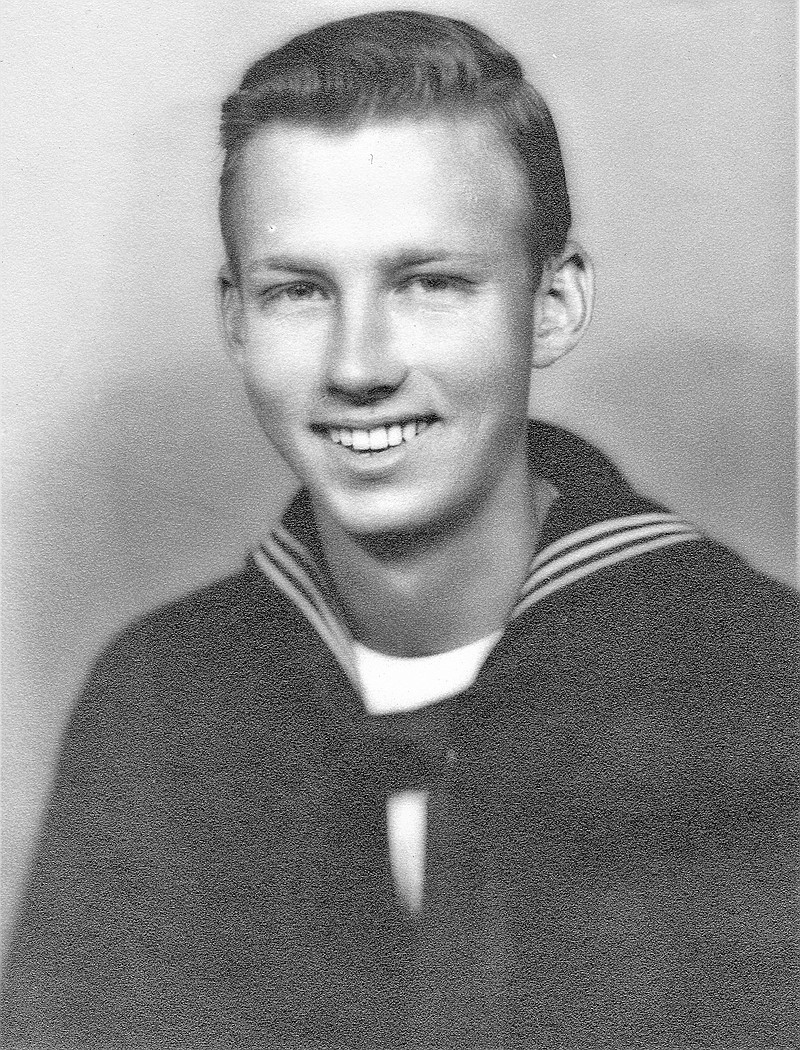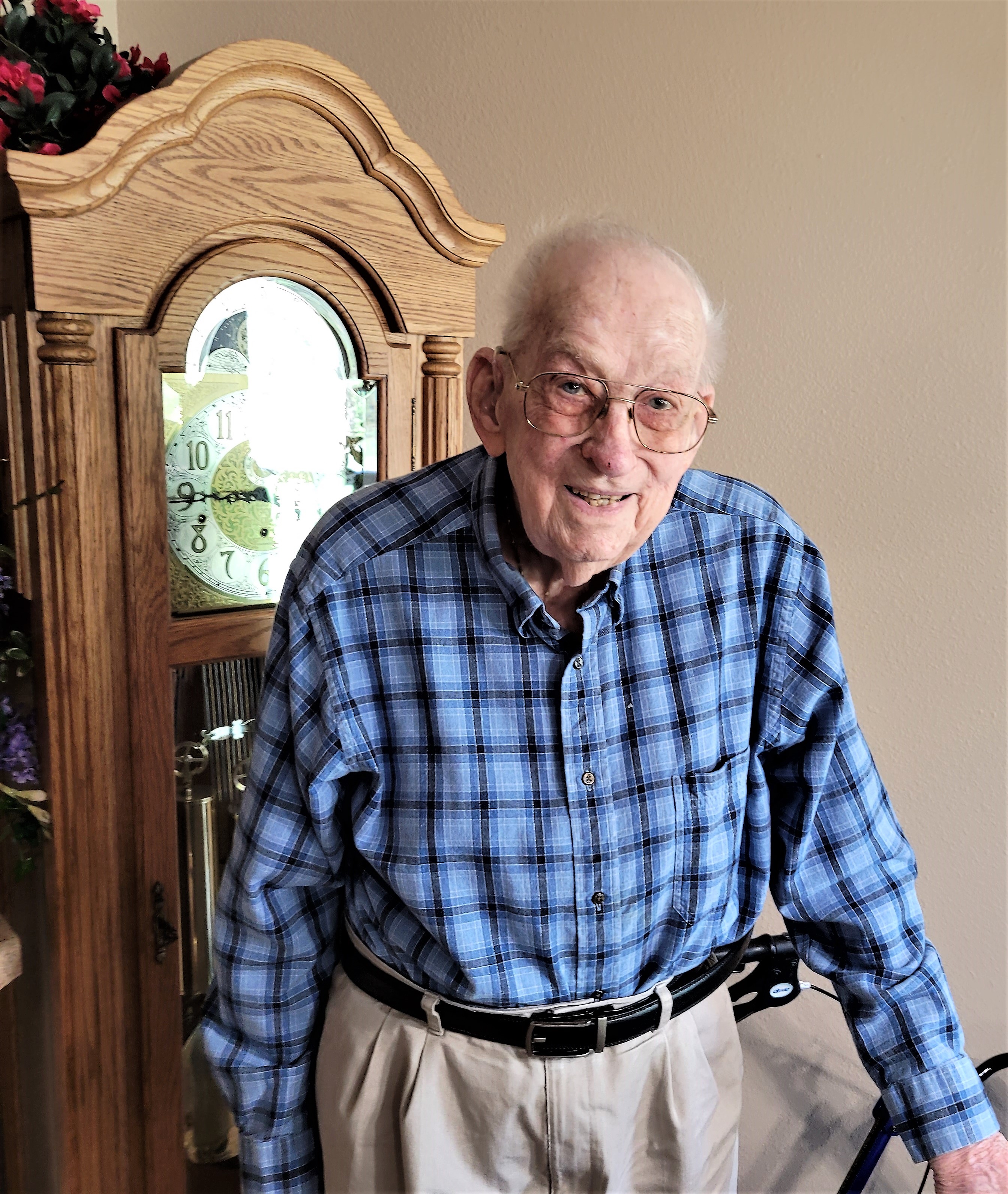Roddy Bruns has achieved the distinction of being a centenarian. In his 100 years, he has amassed immeasurable experiences he enjoys reflecting upon with friends and family, the most satisfying of which tend to be from the time he spent serving his country in the Navy during World War II.
Born in 1922 and the youngest of four children, Bruns was raised in Jefferson City. After graduating from St. Peter High School in 1940, he worked at Central Dairy until receiving his draft notice in 1942.
"It was early enough in the war that you could still pick your branch of service," Bruns recalled. "I didn't want to sleep in a foxhole, and I knew that the Navy always ate off tables. So my dad took me down to see the Navy recruiter and enlist."
The 20-year-old traveled to Great Lakes Naval Training Station in November 1942, spending the next few weeks in boot camp. While in training, he and his fellow recruits underwent testing to reveal their aptitudes for specific career fields within the Navy.
"I did well on the tests, and since I had played trumpet in the original St. Peter band, I said I wanted to be in the Navy band," Bruns recalled. "They said the band was full so I said I expressed an interest in auditing, so they sent me to storekeeper's training."
As a storekeeper, Bruns would be responsible for tracking many types of naval property and equipment. This advanced training took place in Toledo, Ohio, where the sailors were well received by members of the local community.
"The people of Toledo treated us great," he said. "In fact, we didn't have enough sailors there to fulfill all of the dinner invitations we received on Sundays."
When graduating from storekeeper's school, Bruns was assigned to the commissary in Norfolk, Virginia. Months later, in October 1943, he boarded a train in New York and crossed the country, eventually arriving in San Diego to prepare for an overseas deployment.
He recalled, "While we were waiting for the ship to carry us to our assignment, we had some time off and several of us went to Pleasanton, California, to pick apples and make a little extra money."
Bruns joined a small group of sailors departing the West Coast in mid- October 1943 aboard the S.S. Kit Carson -- a Liberty ship carrying lumber and tanks and bound for destinations unknown. They crossed the equator a week later and arrived at Brisbane, Australia, in mid-November.
"I became a one-man draft, the only sailor to get off the ship at Brisbane," Bruns grinned. "A few days later, I got on the USS Gilmer, and we sailed for New Guinea."
Upon arrival at the U.S. Navy Base Gamadodo in the Milne Bay Province of New Guinea, Bruns was assigned to a naval supply depot being carved out of the jungle. He recalled even though the Australians had driven out the Japanese troops prior to his arrival, there were still dead Japanese snipers hanging from trees in the vicinity.
A few weeks later, the Seabees (naval construction battalions) arrived and began developing the naval base. They constructed roads, barracks, mess halls, storage facilities, a pier and, to much delight, a movie theater.
"Finally, we were civilized again," Bruns grinned. "We used the sorting dock the Seabees built to unload and sort supplies that came in on various ships. Everything had a code assigned to it and was stacked on pallets that we moved around using our three fork lifts."
Bruns said the work was done around the clock with teams of sailors working eight-hour shifts. They scrambled to unload supplies and equipment from the incoming vessels, processing and preparing it to be loaded back onto other vessels destined for military bases throughout the South Pacific.
A year into his assignment, he and three fellow sailors were granted several days of leave in Sydney, Australia. The young sailor was able to bring with him something considered a precious commodity; an item that helped them defray many expenses on their trip.
"I took along 30 cartons of cigarettes because the Australians loved American tobacco," he said. "Those cigarettes paid for all of our lodging and all the booze we could drink," he animatedly added.
When their two-week leave ended, Bruns returned to the naval base in New Guinea, continuing to perform his duties as a storekeeper through June 1945. He then returned to the states and spent the next several months at Great Lakes until receiving his discharge on April 5, 1946.
Initially, he experienced some difficulty finding employment back in Missouri, but was eventually hired by Missouri Highway Department. He later retired from the state agency with 40 years of service. In 1963, he married Pat Wisch, and together they raised two sons, Michael and Terry. Pat died in 1993.
Bruns became acquainted with Trudy Tegethoff through a grief coping group at church, and the couple married in 1995. The veteran continued to reveal his imbued work ethic and was employed part-time with Westlake Ace Hardware in Jefferson City for five years in addition to 14 years with Houser-Millard Funeral Home, the latter from which he retired after turning 90 years old.
Bruns recognizes his time in the Navy is little more than a moment in his past. However, it represents a collection of experiences that remain as crisp and clear as if they occurred yesterday.
"I didn't necessarily like the location where I was stationed in the war, but I didn't have a choice and, like everyone else, I made the best of it," he said. "It was one of those things that I wouldn't want to do over again, but it was certainly unforgettable, and I saw a lot of the world that I wouldn't have seen otherwise."
Jeremy P. Ämick is author of the military compilation "Show-Me Veterans."


